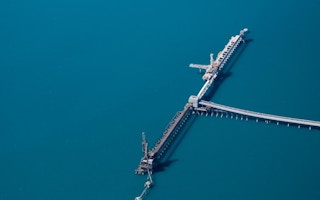HSBC has indicated that it is “extraordinarily unlikely” it will finance the Abbot Point coal terminal expansion, following last week’s confirmation by Deutsche Bank that it would too steer clear of the project. However, there is concern developer Adani is successfully raising money through private investors with a non-transparent wholesale investment product, dodging the issue of reputational risk.
The comment by HSBC was made by chief executive Stuart Gulliver at the company’s annual general meeting in London on Friday, after being asked whether HSBC was willing to match Deutsche Bank’s commitment.
- See our article Deutsche Bank rules out Abbot Point financing following campaign
The Abbot Point expansion, crucial to the export of coal from proposed mines in Queensland’s Galilee Basin, already has government approval, and would involve the dredging of three million cubic metres of seabed in the Great Barrier Reef.
Targeting reputational risk in potential financiers is the latest strategy from environmental activists to halt the project.
“
The social, environmental and economic risks for major financiers being associated with [developer] GVK and Adani’s flawed proposed projects in Queensland become more acutely visible with each passing day
Tim Buckley, director of Energy Resource Studies Australasia at the Institute for Energy Economics and Financial Analysis
HSBC’s position is important considering it is one of the top 20 global financiers of the coal mining industry, according to analysis by Banktrack, with around €2.5 billion ($3.7 billion) of loans and equity underwriting from the 2005-13 period.
Tim Buckley, director of Energy Resource Studies Australasia at the Institute for Energy Economics and Financial Analysis said gaining financial close for Galilee coal projects was becoming “rapidly more elusive”.
“The social, environmental and economic risks for major financiers being associated with [developer] GVK and Adani’s flawed proposed projects in Queensland become more acutely visible with each passing day,” Mr Buckley said.
“HSBC is a global leader in the commercial banking world. So following on from Deutsche Bank’s sector leading stance, the international finance community will be wide awake to the second commitment of this type in days.
“There is an increasingly long line of global investment heavyweights making it as clear as day that there are real reputational risks with respect to operating near the Great Barrier Reef.”
BHP, Rio Tinto, Anglo American and Lend Lease have all pulled out of the project.
On top of reputational risk, analysis by IEEFA shows that the investment proposals were also commercially unviable and would remain stranded for the foreseeable future due to a 50 per cent decline in the price of coal since 2011.
The analysis said the thermal coal industry had moved into “structural decline” due to oversupply and slowing demand due to growth in renewables.
Adani now successfully seeking private investment
There is concern, however, that developer Adani is dodging the issue of reputational risk by raising money through a non-transparent wholesale investment product.
FIIG Securities last week offered an investment-grade (S&P BBB- rated) corporate bond for the Adani Abbot Point Terminal, and this week announced that the $100 million bond had been oversubscribed – meaning there was more demand then there was supply – with strong interest from private investors and self-managed super funds.
The bond features:
- 6.10 per cent yield
- S&P Rated at BBB- (Stable)
- Moody’s Rated at Baa3 (Stable)
- six-year fixed rate
- revenues underpinned by long term “take-or-pay” contracts with average life of 11.5 years
“A successful placement promises to open a new source of funding for Australian companies, showing that Australia’s private, over-the-counter bond market is able to support sizeable deals at a tighter price than in the institutional market,” IFR Asia reported.
However, Mr Buckley said the product was barely investment grade, and the Abbot Point development needed over $10 billion raised, which the developers were certainly not going to raise from an unsophisticated retail market.








